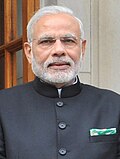| |||||||||||||||||||||||||||||||||||||||||||
543 of the 545 seats in the Lok Sabha[b] 272 seats needed for a majority | |||||||||||||||||||||||||||||||||||||||||||
|---|---|---|---|---|---|---|---|---|---|---|---|---|---|---|---|---|---|---|---|---|---|---|---|---|---|---|---|---|---|---|---|---|---|---|---|---|---|---|---|---|---|---|---|
| Opinion polls | |||||||||||||||||||||||||||||||||||||||||||
| Registered | 911,950,734 | ||||||||||||||||||||||||||||||||||||||||||
| Turnout | 67.40% ( | ||||||||||||||||||||||||||||||||||||||||||
| |||||||||||||||||||||||||||||||||||||||||||
 Results by constituency | |||||||||||||||||||||||||||||||||||||||||||
| |||||||||||||||||||||||||||||||||||||||||||
General elections were held in India in seven phases from 11 April to 19 May 2019 to elect the members of the 17th Lok Sabha. Votes were counted and the result was declared on 23 May.[1][2][3][4] Around 912 million people were eligible to vote, and voter turnout was over 67 per cent – the highest ever, as well as the highest ever participation by women voters until 2024 Indian general election.[5][6][7][c]
The Bharatiya Janata Party received 37% of the vote, the highest vote share by a political party since the 1989 general election, and won 303 seats, further increasing its substantial majority.[9] In addition, the BJP-led National Democratic Alliance (NDA) won 353 seats.[10] The BJP won 37.76%[11] of votes, while the NDA's combined vote was 45% of the 603.7 million votes that were polled.[12][13] The Indian National Congress won 52 seats, failing to get 10% of the seats needed to claim the post of Leader of the Opposition.[14] In addition, the Congress-led United Progressive Alliance (UPA) won 91 seats, while other parties won 98 seats.[15]
Legislative assembly elections in the states of Andhra Pradesh, Arunachal Pradesh, Odisha and Sikkim were held simultaneously with the general election,[16][17] as well as by-elections of twenty-two seats of the Tamil Nadu Legislative Assembly.[18]
Cite error: There are <ref group=lower-alpha> tags or {{efn}} templates on this page, but the references will not show without a {{reflist|group=lower-alpha}} template or {{notelist}} template (see the help page).
- ^ "EC may announce Lok Sabha election schedule in March first week: Sources – Times of India". The Times of India. 18 January 2019. Archived from the original on 5 April 2019. Retrieved 16 February 2019.
- ^ "2019 General Elections: Voting to be held in 7 phases from April 11 to May 19, counting on May 23". Scroll.in. Archived from the original on 7 May 2019. Retrieved 10 March 2019.
- ^ "Lok Sabha Election 2019 Dates Schedule LIVE, Assembly Elections Dates For Andhra Pradesh, Odisha, Sikkim, Arunachal Pradesh, 2019 Election Date Time for Polling, Counting and Results". timesnownews.com. Archived from the original on 4 April 2019. Retrieved 10 March 2019.
- ^ "Lok Sabha elections will begin on April 11 and polling will be held over seven phases through May 19, followed by counting of votes on May 23. Lok Sabha Election 2019 : Key Dates, Live News Updates, Election Calendar". english.manoramaonline.com. Archived from the original on 4 April 2019. Retrieved 13 March 2019.
- ^ At 67.1%, 2019 turnout's a record: Election Commission Archived 21 May 2019 at the Wayback Machine, The Times of India (20 May 2019)
- ^ Polls Are Closed in India's Election: What Happens Next? Archived 19 May 2019 at the Wayback Machine, The New York Times, Douglas Schorzman and Kai Schultz (19 May 2019)
- ^ "India created world record with 64.2 crore people voting in Lok Sabha polls: CEC Rajiv Kumar". The Hindu. PTI. 3 June 2024. ISSN 0971-751X. Archived from the original on 3 June 2024. Retrieved 3 June 2024.
- ^ Women turn out in greater numbers than in previous elections Archived 21 October 2020 at the Wayback Machine, The Economic Times, Aanchal Bansal (20 May 2019)
- ^ "India Election Results: Modi and the B.J.P. Make History". The New York Times. 23 May 2019. Archived from the original on 23 May 2019. Retrieved 23 May 2019.
- ^ "Modi thanks India for 'historic mandate'". 23 May 2019. Archived from the original on 28 May 2019. Retrieved 29 May 2019.
- ^ "Performance of National Parties". eci.gov.in. 23 May 2019. Archived from the original on 7 January 2021. Retrieved 21 May 2023.
- ^ Ramani, Srinivasan (23 May 2019). "Analysis: Highest-ever national vote share for the BJP". The Hindu. Archived from the original on 11 November 2021. Retrieved 22 December 2019 – via www.thehindu.com.
- ^ "61 Crore Indians Voted In 2019 Lok Sabha Elections; 66% Estimated Voter Turnout". HuffPost India. 20 May 2019. Archived from the original on 4 June 2019. Retrieved 22 December 2019.
- ^ "Narendra Modi government will not have Leader of Opposition in Lok Sabha again". India Today. 24 May 2019. Archived from the original on 3 July 2019. Retrieved 17 January 2023.
- ^ "Final numbers are in: 300 paar for PM Modi, Congress stuck at 52". India Today. 24 May 2019. Archived from the original on 27 May 2019. Retrieved 22 January 2023.
- ^ "Assembly polls in 4 states with Lok Sabha elections but not in J&K- Malayala Manorama". english.manoramaonline.com. Archived from the original on 4 April 2019. Retrieved 11 March 2019.
- ^ "Lok Sabha elections 2019: Congress MP favours more seats for RJD in Bihar". 4 September 2018. Archived from the original on 4 April 2019. Retrieved 29 September 2018.
- ^ "AIADMK Proves it Mettle in Tamil Nadu, Maintains Hold on Govt After Winning 9 Bypoll Seats". 23 May 2019. Archived from the original on 8 July 2019. Retrieved 19 June 2019.

